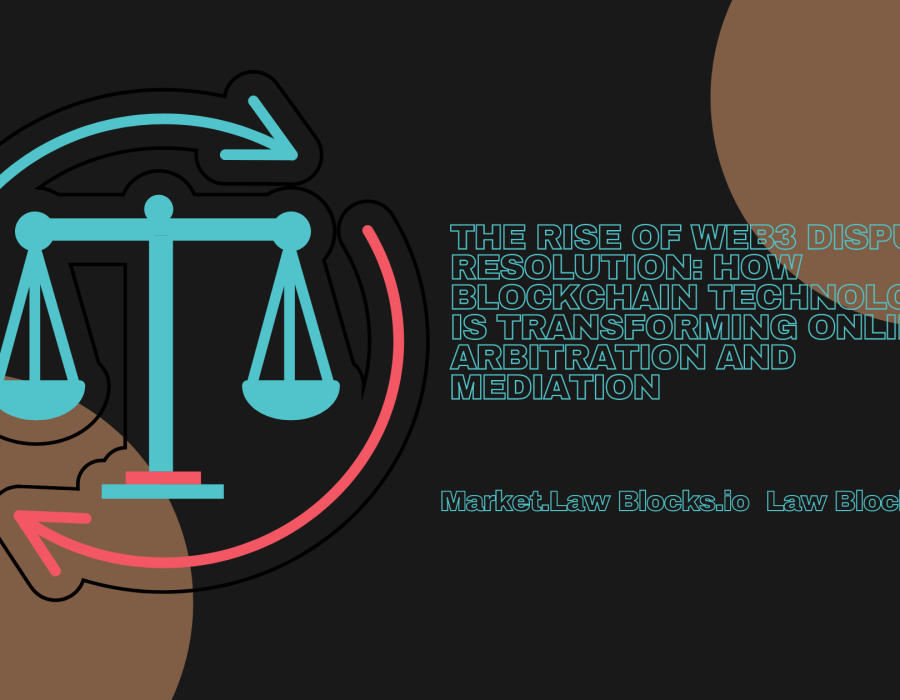Introduction
The internet has revolutionized how we live, work, and interact. However, the digital landscape also presents new challenges, including the rise of online disputes. Traditional methods of conflict resolution, often slow, expensive, and geographically limited, are struggling to keep pace with the speed and scale of the online world.
Enter Web3, the next iteration of the internet built on decentralization, transparency, and user empowerment. Within this evolving ecosystem, a groundbreaking solution is emerging: Web3 online arbitration and mediation.
This article explores how Web3, powered by blockchain technology, is transforming online dispute resolution (ODR) by offering a faster, fairer, and more accessible approach.
The Limitations of Traditional ODR
While online dispute resolution platforms have emerged in recent years, they often face limitations:
Centralized Control
These platforms are often controlled by a single entity, raising concerns about neutrality and potential bias.
Lack of Transparency
Dispute resolution processes can be opaque, leaving participants unsure of the reasoning behind decisions.
Limited Enforcement
Enforcing ODR decisions across borders can be challenging, creating uncertainty for dispute resolution.
High Costs
Arbitration and mediation services can be expensive, limiting access to justice for many users.
Web3
Web3 offers a unique set of features that address these limitations and pave the way for a more efficient and equitable ODR system:
Decentralization
No single entity controls the platform, promoting neutrality and reducing bias.
Transparency
Blockchain technology provides an immutable record of all interactions within the dispute resolution process.
Security
Data is securely stored on the blockchain, minimizing the risk of tampering or loss.
Smart Contracts
Self-executing contracts can automate key aspects of the ODR process, streamlining resolution.
Cryptocurrencies
Crypto tokens can be used for dispute resolution fees, enabling faster and more cost-effective transactions.
Web3 Arbitration
Web3 arbitration offers several advantages over traditional methods:
Faster Resolution
Automated processes and smart contracts can expedite dispute resolution, saving time and resources for all parties involved.
Reduced Costs
Eliminating intermediaries and leveraging blockchain technology can significantly reduce administrative costs associated with arbitration.
Global Reach
The decentralized nature of Web3 allows for borderless dispute resolution, making it ideal for international disputes.
Enhanced Security
Blockchain technology ensures the secure storage and immutability of all evidence and documents related to the dispute.
Increased Transparency
All participants can access a transparent record of the arbitration process, fostering trust and accountability.
Web3 Mediation
Web3 can also transform online mediation:
Neutral Third-Party Support
Decentralized platforms can connect disputing parties with qualified mediators using a secure and transparent process.
Improved Communication
Web3 platforms can facilitate secure and efficient communication between parties and the mediator.
Community-Driven Incentives
Web3 communities can incentivize fair and efficient mediation through reputation systems and token rewards.
Empowering Users
Web3 empowers users to participate actively in the mediation process, leading to more informed and mutually agreeable solutions.
Challenges and Considerations for Web3 ODR
While Web3 ODR holds immense potential, there are challenges to address:
Regulation
The legal frameworks for Web3 and blockchain-based ODR are still evolving, requiring clear regulations to ensure user protection and enforceability of decisions.
Technical Adoption
Wider adoption of Web3 technology and user education are crucial for mainstream acceptance of Web3 ODR platforms.
Smart Contract Security
Ensuring the security and bug-free nature of smart contracts used in ODR processes is paramount.
Dispute Resolution Expertise
Building a pool of qualified and experienced arbitrators and mediators within the Web3 ecosystem is essential.
The Future of ODR is on the Blockchain
Despite these challenges, the potential of Web3 ODR is undeniable. As the technology matures and regulations evolve, Web3 ODR platforms have the potential to:
Increase access to justice
By making ODR faster, cheaper, and more accessible, Web3 can empower individuals and businesses to resolve disputes efficiently.
Enhance trust in the ODR process
Transparency and immutability provided by blockchain can build trust in the fairness and legitimacy of online dispute resolution.
Empower users and communities
Web3 ODR fosters user participation and community-driven incentives, promoting a more collaborative and responsible approach to conflict resolution.





Comments